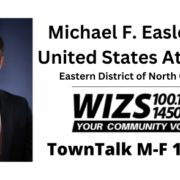Operation Resilience – A Coordinated Enforcement Operation in Henderson
Press Conference Audio
With the Henderson Police Station as a backdrop, representatives from local, state and federal law enforcement agencies announced Friday the arrests of five individuals on federal charges ranging from drugs violations to possession of firearms.
Operation Resilience cast a wide net over the course of the past couple of days, and District Attorney Mike Waters commended all those gathered for the press conference on Friday afternoon.
U.S. Attorney for the Eastern District Ellis Boyle echoed the sentiments, highlighting the work of the ATF. “You made the evidence, you gave us the cases and we are committed to prosecuting them in federal court,” Boyle said during remarks at the press conference.
According to information provided by the office of U.S. Attorney for the Eastern District, the following individuals were charged as a result of Operation Resilience:
- Qwmaine Raekwon Knott of Henderson, 29, is charged with possession with intent to distribute 40 grams or more of fentanyl. If convicted, he faces a mandatory minimum sentence of 10 years and up to life in prison.
- Andre Khan of Henderson, 30, is charged with possession with intent to distribute fentanyl, possession of a firearm in furtherance of a drug trafficking crime, and possession of a firearm by a felon. If convicted, he faces a mandatory minimum sentence of five years, consecutive to any other sentence, and up to life in prison.
- Terrance Hargrove of Henderson, 47, is charged with possession with intent to distribute cocaine, possession of a firearm in furtherance of a drug trafficking crime, and possession of a firearm by a felon. If convicted, he faces a mandatory minimum sentence of five years, consecutive to any other sentence, and up to life in prison.
- Keith Bagley of Oxford, 46, is charged with possession of a firearm by a convicted felon. If convicted, he faces up to 15 years in prison.
- Shamar Evans of Oxford, 34, is charged with possession with intent to distribute crack cocaine and possession of a firearm by a felon. If convicted, he faces a minimum of five years and up to 35 years in prison.
Henderson Police Chief Marcus Barrow said, “This operation exemplifies the effectiveness of collaboration among law enforcement agencies with diverse areas of expertise. Extensive preparation was devoted to its planning and execution, and the success achieved reflects the strength of federal, state, and local agencies working in unison. As the Chief of Henderson, I am proud of our relationship with each of these agencies and look forward to more proactive projects in the near future.”
Barrow provided a comprehensive list of arrests and charges to WIZS News following the press conference. Not included in the information below, however is information from the N.C. State Highway Patrol or the Alcohol Law Enforcement agency. Barrow said he expects to have that information soon.
Arrests and Charges
– Felony Arrests: 8 individuals arrested on 26 charges
– Misdemeanor Arrests: 9 individuals arrested on 14 charges
– Charges from Citations: 24
Federal Indictments
– Subjects Taken into Custody: 5 detainees on 10 charges
North Carolina Department of Adult Correction
Probation/Parole Enforcement
– Felony Absconders: 3 arrests
– Misdemeanor Absconders: 2 arrests
– Felony Probation Violations: 5 arrests
– Misdemeanor Probation Violations: 1 arrest
Seizures and Evidence
– Search Warrants Obtained and Served: 4
– Firearms Seized: 4 with 1 being stolen
– Controlled Substances Seized:
– Cocaine: 159.45 grams
– Heroin: 100 dosage units
– Marijuana: 62 grams
– MDMA: 3 grams
– Methamphetamine: 2 grams
Henderson Police Capt. Ferguson said the operation – a month or more in the making – was the result of the police department and Adult Corrections putting together a list of absconders from parole and repeat offenders.
N.C. Secretary for the Department of Adult Correction Leslie Dismukes said 29 probation officers participated in the operation, which netted the arrest of five absconders and eight others for a total of 19 felony charges, six misdemeanor charges and confiscation of two firearms.
“Safe communities is the number one priority of Adult Corrections,” Dismukes said during the press conference. Dismukes also thanked Vance County District Attorney’s Office for the partnership of the department’s ongoing efforts to reduce crime and ensure compliance among those it supervises.
The primary objective of the operation was to perform warrantless searches of supervised offenders and their residences while apprehending individuals with active arrest warrants related to probation or post-release supervision violations.
The searches were conducted Thursday, Sept. 18 between 6 a.m. and 5 p.m. Participating in the operation were probation officers from the N.C. Dept. of Adult Correction, officers from Henderson Police Department, deputies from the Vance County Sheriff’s Office, federal agents from the FBI and the Bureau of Alcohol, Tobacco, Firearms and Explosives (ATF), state agents from N.C. Alcohol Law Enforcement (ALE) and N.C. State Bureau of Investigation (SBI) and troopers from the N.C. State Highway Patrol. Prosecutions are being handled by the Vance County District Attorney’s Office and the U.S. Attorney’s Office for the Eastern District of North Carolina.
Today, U.S. Attorney Ellis Boyle, along with federal and local law enforcement, announced that five individuals have been charged in separate federal cases as part of a coordinated enforcement operation. In addition to the federal charges, more than 30 state warrants were executed in the Henderson area. The operation targeted violent offenders, drug traffickers, and absconders, reinforcing the federal government’s commitment to protecting communities destabilized by violent crime and drug activity.
“These charges and arrests show that law enforcement will not stand idly by while violent offenders and absconders fuel instability in Henderson,” said U.S. Attorney Ellis Boyle. “This surge reflects the strength of our local, state, and federal partnerships, and we remain committed to supporting Henderson and Vance County in this united fight against crime. If you commit a federal crime, you can expect to spend a lot of prison time.”
“The FBI is committing resources to support our law enforcement partners across North Carolina every day. The FBI Raleigh Durham Safe Streets Task Force is honored to have assisted the Henderson Police Department in this important fugitive roundup. When we work together to address and mitigate violent crime, the American people win and the Justice system can take the next step to hold offenders convicted in court, accountable,” said James C. Barnacle Jr., the FBI Special Agent in Charge in North Carolina.
“Enforcement operations like this demonstrate the importance of collaboration,” said ATF Special Agent in Charge Alicia Jones. “Through partnerships and a commitment to public safety, we’re finding and apprehending those individuals that pose the greatest threats to our communities.”
“Violent offenders threaten the safety and stability of our neighborhoods, and this operation shows the strength of coordinated law enforcement at every level,” said U.S. Marshal Glenn M. McNeill, Jr., of the Eastern District of North Carolina. “The U.S. Marshals Service remains committed to working alongside our federal, state, and local partners to ensure fugitives are apprehended and communities across Henderson and Vance County are safer as a result of these efforts.”
“This operation is a result of planning, intelligence sharing, and collaboration. It sends a clear message that criminal activity has no place in our neighborhoods, and we will use every resource available to uphold the safety and integrity of our communities,” said Commander of the State Highway Patrol, Colonel Freddy L. Johnson, Jr. “But our work does not stop with arrests, it continues with prevention, community outreach, and making sure that our enforcement efforts are matched by support for the families and neighborhoods most affected by crime.”
“On behalf of the SBI and our hard-working agents, we are extremely proud to join forces with our local, state, and federal partners to arrest probationers and absconders in Vance County to reduce crime and keep citizens safe. We are committed to assisting our sheriffs, chiefs, and U.S. Attorneys with the ongoing effort to get drugs off the street and put violent offenders in jail. Without the strong partnerships with other law enforcement agencies, the success of this type of operation would not be possible,” said the North Carolina SBI Director Chip Hawley.
“Successful collaboration with our local, state, and federal partners is essential to strengthening our communities and making North Carolina safer for everyone,” said ALE Director Bryan House. “I’m grateful for the strong relationships we’ve built that make operations like this possible.”
“This operation is an excellent example of how effective law enforcement collaboration can be in improving safety in our communities,” said Leslie Cooley Dismukes, Secretary for the Department of Adult Correction. “I’d like to thank all our law enforcement and prosecution partners for their ongoing assistance to reduce crime and ensure compliance among those we supervise.”
“This operation exemplifies the effectiveness of collaboration among law enforcement agencies with diverse areas of expertise. Extensive preparation was devoted to its planning and execution, and the success achieved reflects the strength of federal, state, and local agencies working in unison. As the Chief of Henderson, I am proud of our relationship with each of these agencies and look forward to more proactive projects in the near future,” said Henderson Police Chief Marcus Barrow.
Participating agencies included the FBI, the ATF, the U.S. Marshals Service, the North Carolina State Highway Patrol, the North Carolina SBI, the North Carolina ALE, the North Carolina Department of Adult Correction, District Attorney Mike Waters, the Henderson Police Department, the Oxford Police Department, and the Vance County Sheriff’s Office.
Law enforcement divided the effort into three arrest teams and three search teams, conducting approximately 30 absconder warrant services and 40 warrantless searches. Together, the teams executed coordinated arrests and searches aimed at reducing violent crime and holding fugitives accountable. According to court documents, the following five individuals, all from the Henderson area, were arrested on federal charges as part of the recent enforcement effort:
• Qwmaine Raekwon Knott of Henderson, 29, is charged with possession with intent to distribute 40 grams or more of fentanyl. If convicted, he faces a mandatory minimum sentence of 10 years and up to life in prison.
• Andre Khan of Henderson, 30, is charged with possession with intent to distribute fentanyl, possession of a firearm in furtherance of a drug trafficking crime, and possession of a firearm by a felon. If convicted, he faces a mandatory minimum sentence of five years, consecutive to any other sentence, and up to life in prison.
• Terrance Hargrove of Henderson, 47, is charged with possession with intent to distribute cocaine, possession of a firearm in furtherance of a drug trafficking crime, and possession of a firearm by a felon. If convicted, he faces a mandatory minimum sentence of five years, consecutive to any other sentence, and up to life in prison.
• Keith Bagley of Oxford, 46, is charged with possession of a firearm by a convicted felon. If convicted, he faces up to 15 years in prison.
• Shamar Evans of Oxford, 34, is charged with possession with intent to distribute crack cocaine and possession of a firearm by a felon. If convicted, he faces a minimum of five years and up to 35 years in prison.
Assistant U.S. Attorneys Charles Loeser, Jaren Kelly, and Special Assistant U.S. Attorney Erin Becker are prosecuting the cases.
These federal cases are part of Operation Take Back America, a nationwide initiative that marshals the full resources of the Department of Justice to repel the invasion of illegal immigration, achieve the total elimination of cartels and transnational criminal organizations (TCOs), and protect our communities from the perpetrators of violent crime. Operation Take Back America streamlines efforts and resources from the Department’s Organized Crime Drug Enforcement Task Forces (OCDETFs) and Project Safe Neighborhood (PSN).
A copy of this press release is located on our website.
An indictment is merely an accusation. The defendants are presumed innocent until proven guilty.




